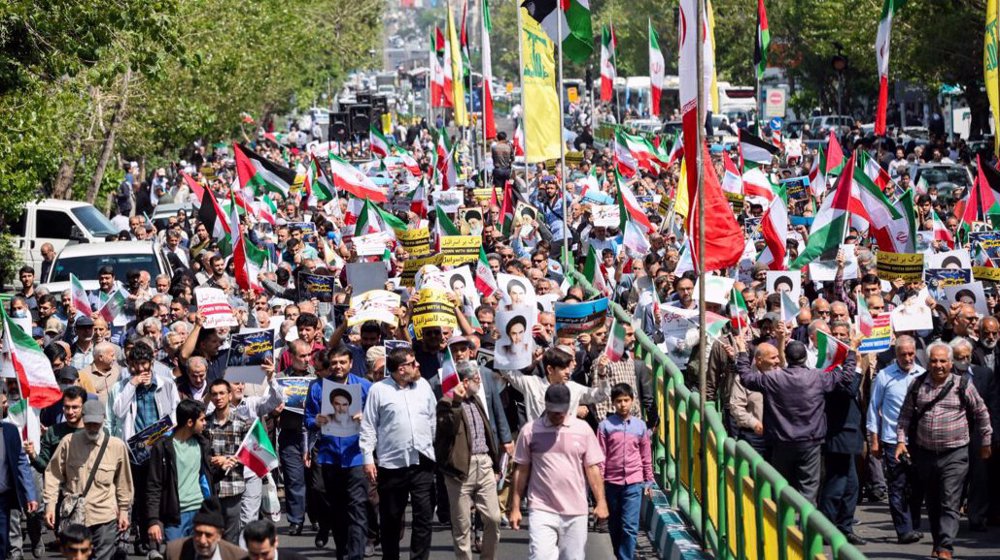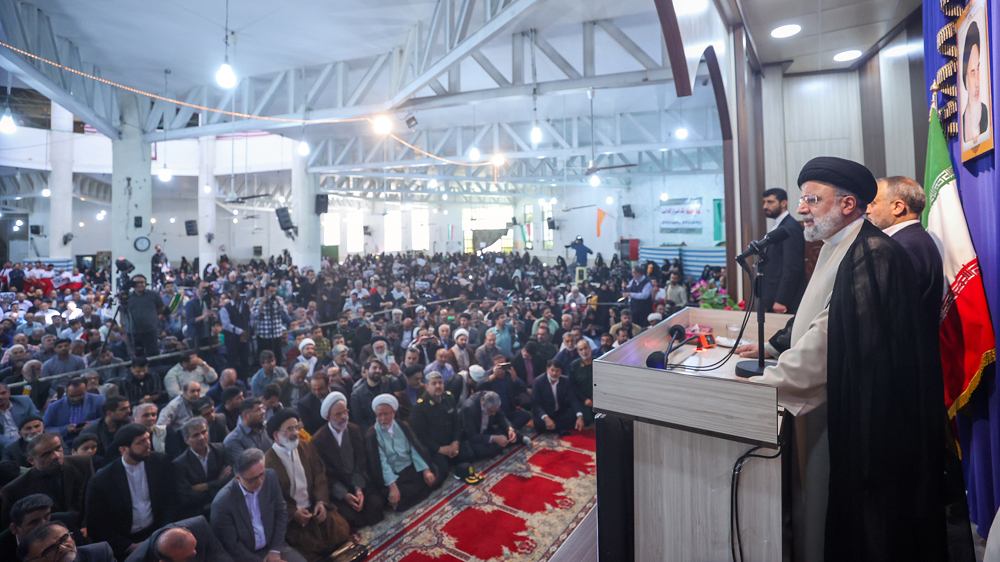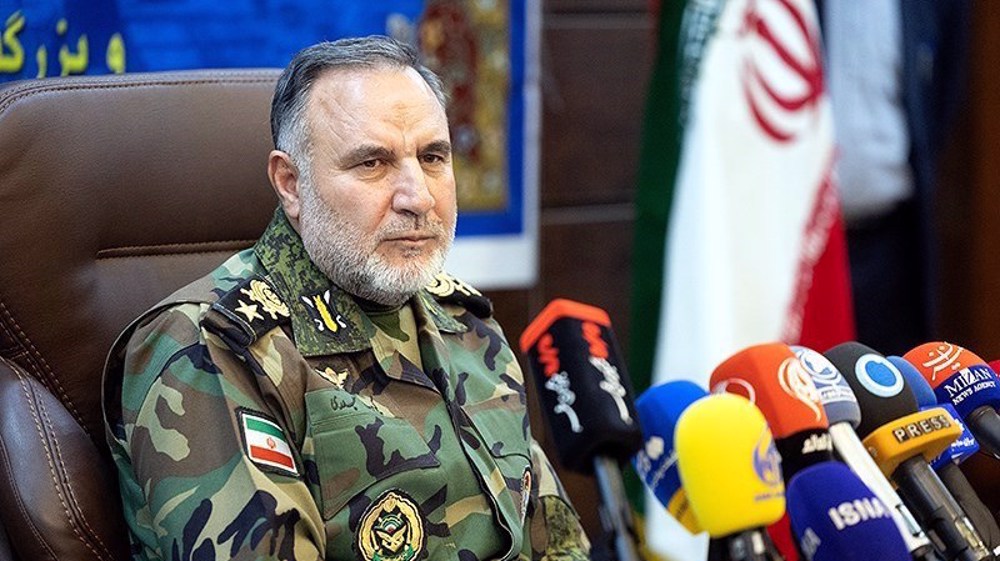Defying US sanctions, Iran inaugurates new South Pars gas field phases
Iran's President Hassan Rouhani has inaugurated four new phases of the huge offshore South Pars gas field in a move, which has been seen as a clear sign of the failure of US sanctions against the country.
During an inaugural ceremony in the southern coastal city of Kangan on Sunday, Iran's president officially launched phases 13, 22, 23, and 24 of South Pars gas field, noting that despite all the US pressures on the Iranian nation, especially through the imposition of unilateral economic sanctions, Iranians remain steadfast and resistant and continue to progress.
“Americans did not want us to inaugurate any important projects during the current year, but we made all projects operational on schedule,” Rouhani said.
“Today is a very auspicious day for the Iranian nation, which has dealt strong blows to enemies, because they thought that by imposing sanctions, they would be able to stop all our plans and advances,” Rouhani added.

The inauguration of the new phases of Iran's South Pars gas field has been seen by experts as a clear sign of the failure of US sanctions against the country’s energy sector, which were mainly meant to curtail Iran's production of oil and gas as its main revenue sources.
US President Donald Trump withdrew Washington in May last year from the landmark Iran nuclear agreement, known as the Joint Comprehensive Plan of Action (JCPOA) reached between Iran and the P5+1 group of countries in 2015, and decided to re-impose unilateral sanctions against Tehran.
Under the deal, Iran undertook to put limits on its nuclear program in exchange for the removal of nuclear-related sanctions.
Trump's administration announced re-imposition of the “toughest” sanctions ever against Iran's banking and energy sectors with the aim of cutting off the country's oil sales and crucial exports.

Elsewhere in his remarks, Rouhani said, "Enemies thought that they would mount such economic pressure on [the Iranian] people that our people would bend the knee in front of superpowers. However, this great and history making nation has demonstrated its steadfastness and resistance at all junctures of its history, especially during the current year, which is nearly finished.”
Noting that “the sanctions imposed by the United States against Iran are sanctions against humanity,” Iran's chief executive emphasized that what Americans are doing against Iran is a crime against humanity, but “America will never achieve its goals.”

“Before being an economic war, sanctions are psychological war through which America is trying to make the Iranians pessimistic about their future … and make them think that as time goes by, their conditions will deteriorate,” Rouhani said.
Saying that production of gasoline in Iran has been doubled since the inauguration of his administration, Rouhani said, “During recent rounds of sanctions, we saw that the United States did not even think about imposing gasoline sanctions on Iran, because it knew that Iran has become self-sufficient in gasoline production. Today, we are also self-sufficient in producing diesel fuel and gas.”
In a TV interview back in February, Iranian Oil Minister Bijan Zangeneh said the country has become self-sufficient in gasoline production despite US sanctions on its energy sector.
His remarks came after President Rouhani inaugurated the third phase of a gas condensate plant, known as the Persian Gulf Star Refinery, in the southern city of Bandar Abbas.
The gas condensate plant supplies various petroleum products, including diesel fuel, gasoline, hydrogen, sulfur and jet fuel.
"Fortunately, we do not need to import gasoline anymore. We have reached self-sufficiency. We can export our produced gasoline, but have no export plans," Zangeneh was quoted as saying by the Islamic Republic of Iran Broadcasting.
According to a report by IRNA, Phase 13 of South Pars gas field has four offshore platforms, 38 wells and four 90-kilometer pipelines, and has been completely designed and made operational by Iranian experts.
The phase is to produce 56 million cubic meters of gas, 75,000 barrels of gas condensate, and 400 tonnes of sulfur on a daily basis in addition to annual production of 1.5 million tonnes of liquefied petroleum gas (LPG) and one million tonnes of ethane.
Total value of the phase 13's products has been estimated at five million dollars per day.
South Pars Phases 22, 23 and 24 consist of four offshore platforms, 38 wells and three pipelines, which have been completely designed and made operational using Iranian equipment. They will transfer two billion cubic feet of gas to onshore facilities.
On the whole, the four phases are to produce 56 million cubic meters of gas, 77,000 barrels of condensate and 400 tonnes of sulfur per day in addition to annual production of 1.5 million tonnes of liquefied gas and one million tonnes of ethane. The daily value of their products has been estimated at 30 billion dollars.
The inauguration of the new South Pars phases will also increase Iran's current production capacity by 113 million cubic meters of enriched gas, 100 million cubic meters of methane, 150,000 barrels of condensate and 800 tonnes of sulfur granules per day. On an annual basis, the country will be producing 2.1 million tonnes of liquefied gas and two million tonnes of ethane as the main feed for petrochemical plants.
The four new phases of South Pars gas field have been made operational at a cost of more than 11 billion dollars, enabling Iran to outdo the neighboring Qatar in gas production from the joint field for the first time.
Yemenis, Jordanians reiterate support for Palestinians in Gaza
Iranians rally nationwide in support of Operation True Promise
Raeisi: Operation True Promise ‘a necessary response’ to Israel
OIC slams US for blocking Palestine’s bid for full UN membership
US police arrest 108 pro-Palestine protesters at Columbia University
Top commander names four 'historic achievements' of Operation True Promise
VIDEO | Iranian attack and crisis of entity
UN chief: Israel’s war turned Gaza into 'humanitarian hellscape'











 This makes it easy to access the Press TV website
This makes it easy to access the Press TV website